11 Montessori Math Games Your Kids Will Love This Summer
As summer break approaches, it’s time to prepare for a season of relaxation and adventure. However, amidst the excitement, it’s crucial to keep young minds active and engaged in learning. That’s where math games for summer learning come into play!
Drawing on my background as a Montessori elementary teacher and stepmom, I’ve made this list of hands-on math activities to entertain and enhance your child’s math skills. By incorporating interactive games, they not only enjoy the learning process but also reap the benefits of games in education.
The perfect blend of fun and education to keep kids in the second plane of development entertained while sharpening their math skills, these 11 Montessori-aligned math games will make learning feel more like playtime than study time.
💡🔢💡🔢💡
Our 3 Favorite Math Games for Summer Learning
Counting Coin Jars
Pattern Puzzles with Tangrams
Addition and Division BINGO Game

11 Math Games for Summer Learning
These hands-on, brain-boosting activities will keep elementary-aged children entertained while reinforcing essential math concepts in a playful way. This is what we like to call learning in disguise!
Give some or all of these math games a try for some mathematical excitement this summer break.
Graphing Galore
Invite children to conduct surveys among family members or friends to gather data on their favorite colours, foods, or activities. Once the data is collected, guide them through the process of organizing the information into simple bar graphs or pictographs to visually represent the collected data.
Through this activity, children not only enhance their mathematical skills by interpreting graphs but also develop their analytical thinking as they analyze trends and patterns in the data.
Get your elementary-aged kids excited about graph-making with this engaging video!
Shape Scavenger Hunt
Go on a shape scavenger hunt around the house, backyard, park, or throughout your neighborhood. Encourage children to explore their surroundings as they search high and low for objects that mirror various 2D and 3D shapes – circles, cubes, triangles, rectangles, and even cones.
Extend the activity by giving children 2D nets of shapes to construct, then encourage them to identify and locate the corresponding 3D shapes in their surroundings.
This hands-on activity not only reinforces shape recognition but also stimulates their curiosity and observation skills. As they eagerly identify shapes in everyday objects, children engage in active learning, making meaningful connections between abstract concepts and the tangible world around them.

Counting Coin Jars
Fill jars with a mix of coins and have children count the total value in each jar. As they sort and count coins of different denominations, they’ll not only sharpen their basic counting skills but also explore the fascinating world of money.
But the adventure doesn’t end there! Encourage kids to take it a step further by separating and rolling coins of the same value. Then, turn this into a real-world going out excursion by heading to the bank to deposit their newfound wealth. This teachable moment bridges the gap between mathematical learning and everyday life.
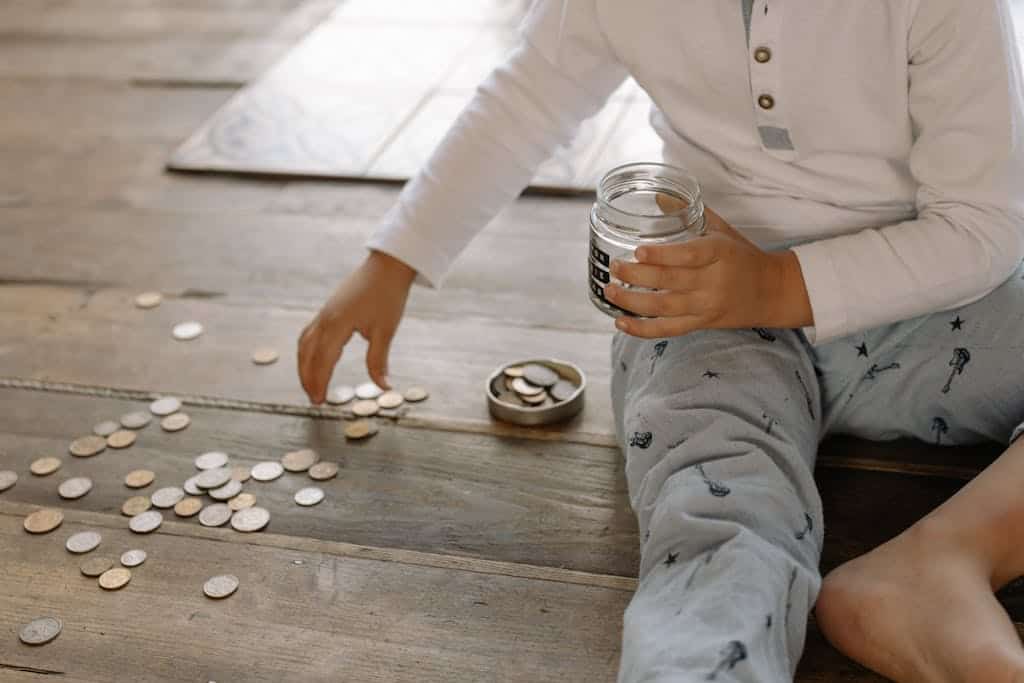
Through this immersive experience, children not only enhance their mathematical proficiency but also cultivate financial literacy skills. They’ll gain a deeper understanding of the value of each coin and learn the importance of responsible money management – all while having a blast practicing math!
💡 Teacher Tip: Pair this activity with a great money-themed read!
Check out our top picks: Teach Kids About Money: 35 Financial Literacy Books They’ll Love
Measurement Madness
Equip children with rulers or tape measures and set them loose to explore the lengths of various household items or objects outdoors. From the height of trees to the length of books, every object becomes something to be measured.
Engage children in comparing and contrasting lengths to sharpen their estimation skills, fostering a practical and enjoyable understanding of measurement. Incorporate this activity into your repertoire of fun math activities for kids, turning summer into a season of experiential learning. With each measurement, children uncover new discoveries and boundless possibilities!

Fraction Pizza Party
A fraction pizza party is a math activity where kids get to become pizza chefs! Using paper plates as pizza bases and a variety of craft supplies as toppings, children can let their creativity run wild as they learn about fractions.
They’ll divide their pizzas into halves, thirds, or quarters as they add toppings, grasping the concept of fractions in a tasty and engaging manner. With this engaging fraction pizza activity, math learning becomes as satisfying as savouring a mouthwatering slice of pizza!
Here’s a more clear picture of what this activity entails:
Pattern Puzzles with Tangrams
Tangrams are a fun and engaging way to boost visual and geometric thinking. With just seven simple shapes, kids can create endless picture combinations that spark creativity and sharpen problem-solving skills. Looking for a hands-on way to challenge your elementary students?
Try this tangram puzzle set and watch them light up as they piece together each design like a mini puzzle master.
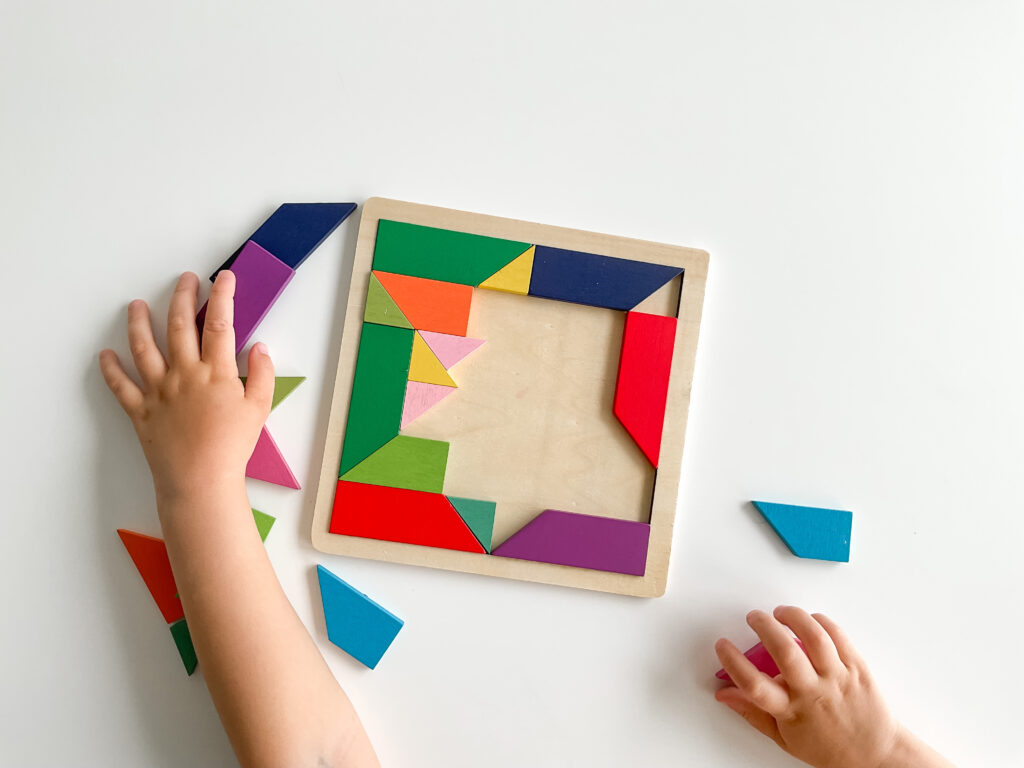
As they manipulate shapes to form patterns, children develop essential problem-solving skills, sharpening their spatial awareness and honing their ability to recognize and create patterns. Your child’s arithmetic skills, visual acuity, and geometric understanding will blossom with every twist and turn of the puzzle pieces!
💡Teacher Tip: If your kids enjoy these puzzles, they’ll love rebus puzzles too!
Check out our collection of engaging rebus puzzle products and our blogs about rebus puzzles for hours of brain-teasing fun and learning.
Math BINGO With a Twist
Elevate traditional BINGO with our Addition and Division BINGO game! Instead of numbers, students roll a dice, calculate the sum, and search for the that sum as a quotient on their game boards. It’s a thrilling blend of arithmetic practice and classic game excitement, keeping young learners engaged and motivated to master their math skills.
With each equation solved and answer marked, students strengthen their understanding of addition and division while having a blast playing this interactive game. Ready to roll the dice and shout “BINGO!”? Get your copy of our printable game board and let the math-filled fun begin!
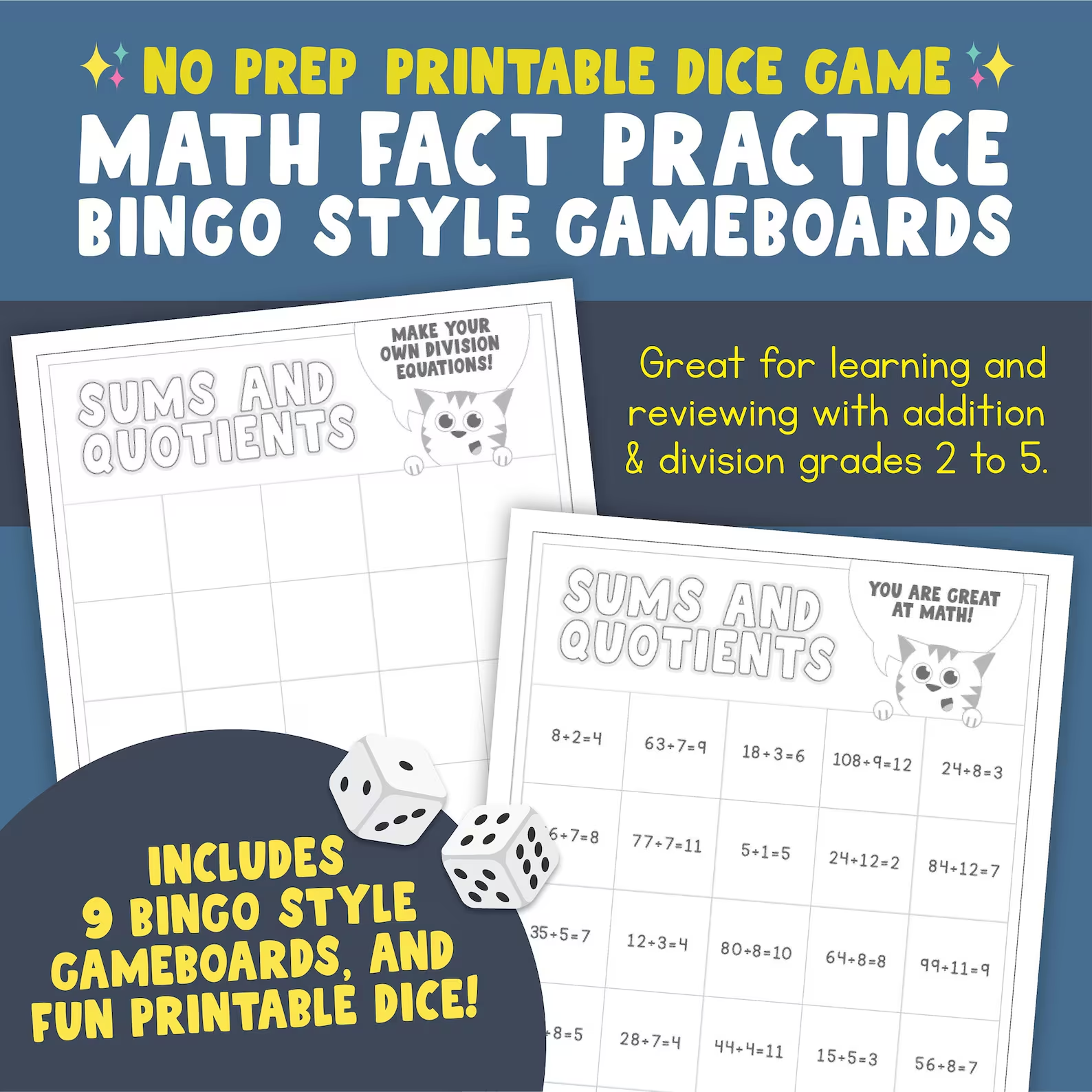
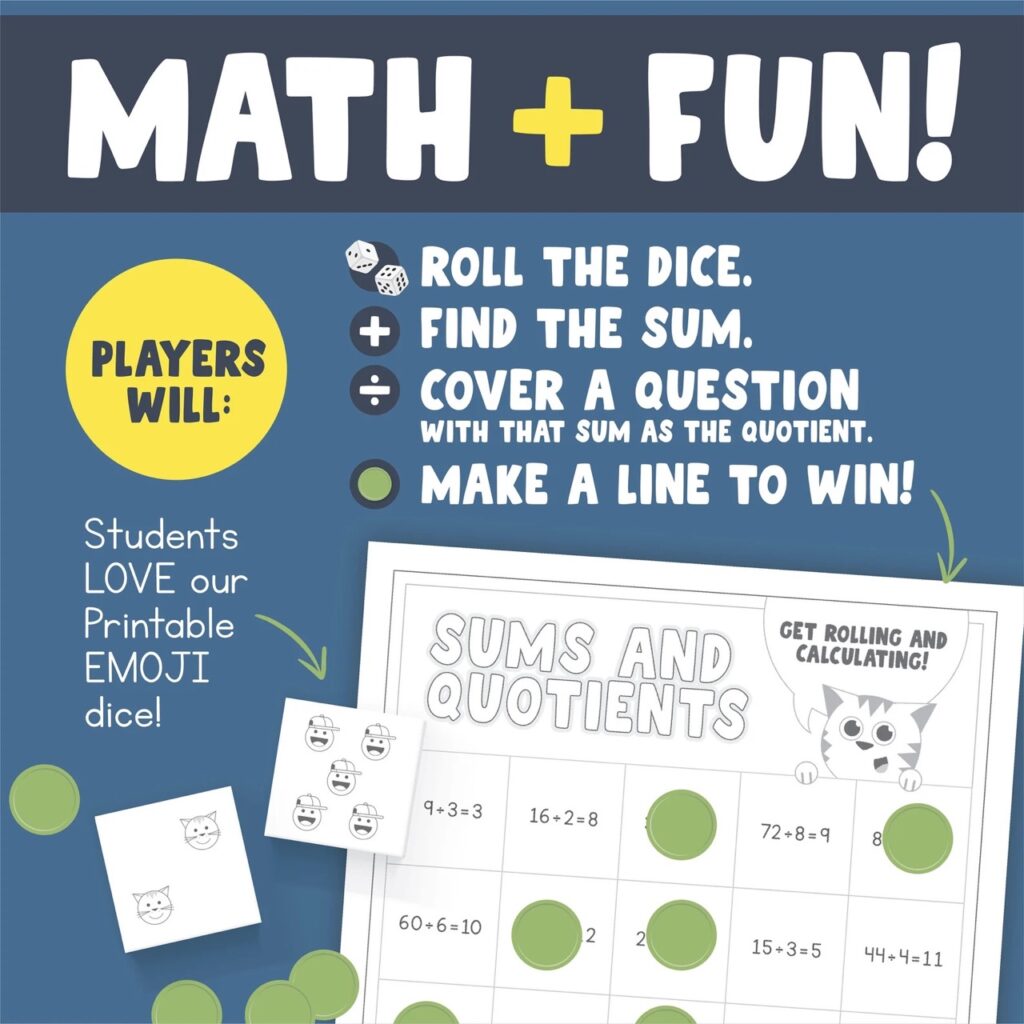
Time Telling Tic-Tac-Toe
Draw a tic-tac-toe grid with different times on each square displayed on an analog clock. Players take turns deciphering the time showcased and placing their guesses on the grid.
This math game for summer learning not only cultivates time-telling proficiency but also infuses the timeless fun of tic-tac-toe into the learning experience. With every turn, children hone their time-telling skills and revel in the joy of playful competition.
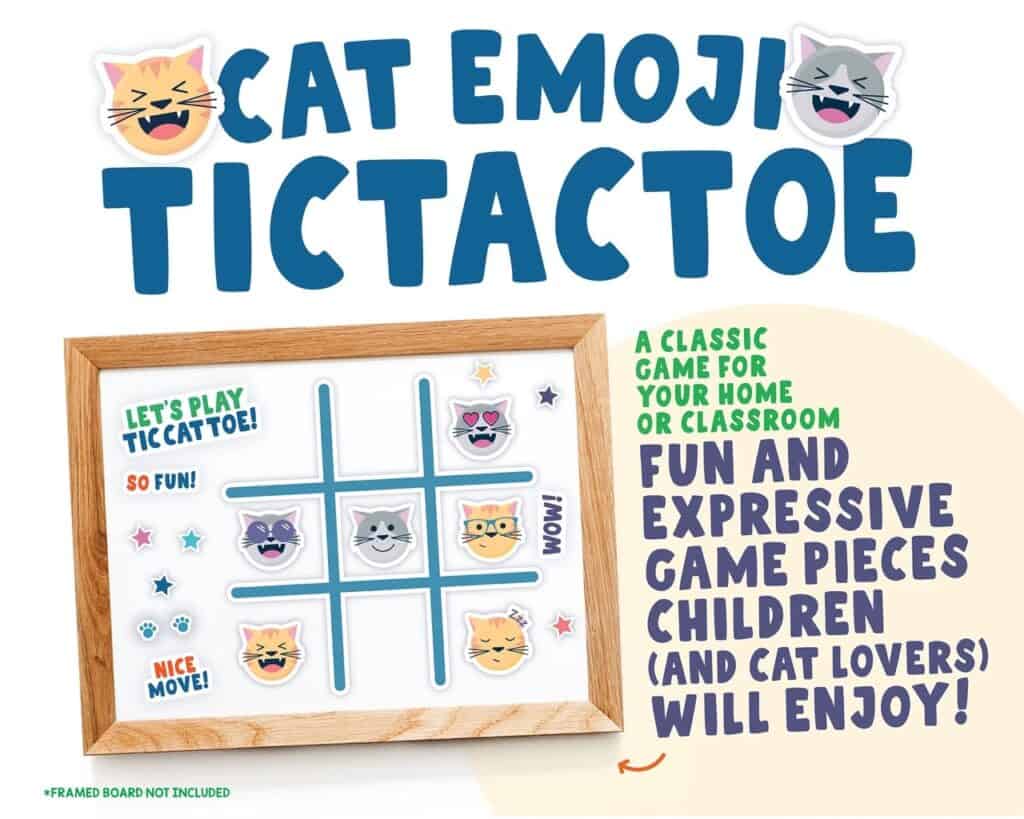
💡 Teacher Tip: Here’s another fun Tic-Tac-Toe activity for kids!
Get your paws on this Tic-Tac-Toe Game with cat emojis.
Math Fact Memory Match
Create pairs of cards featuring math facts and their corresponding answers, focusing on one mathematical operation at a time. Whether it’s addition, subtraction, multiplication, or division, this versatile math card game adapts to suit your chosen math concept.
Arrange the cards in two columns, one displaying the math facts and the other showcasing the answers, all face down. Players eagerly flip over two cards – one from each column – and set off on a quest to find matching pairs. The twist? They must solve the math fact to determine if it matches the answer they’ve revealed.

Enhance the game with a self-correcting element, such as an answer sheet, to provide immediate feedback. This feature reinforces correct answers, empowering players to refine their mathematical prowess with each successful match.
Logic Puzzle Play
Introducing children to logic puzzles provides an engaging way to stimulate their critical thinking and problem-solving abilities. Activities like solving a Rubix’s Cube, figuring out patterns in Sudoku for Kids, putting together a jigsaw puzzle, or going through a logic workbook really keep kids sharp!
These puzzles encourage children to apply logical reasoning and deduction to solve challenges, fostering math skills such as pattern recognition, spatial awareness, and strategic planning.
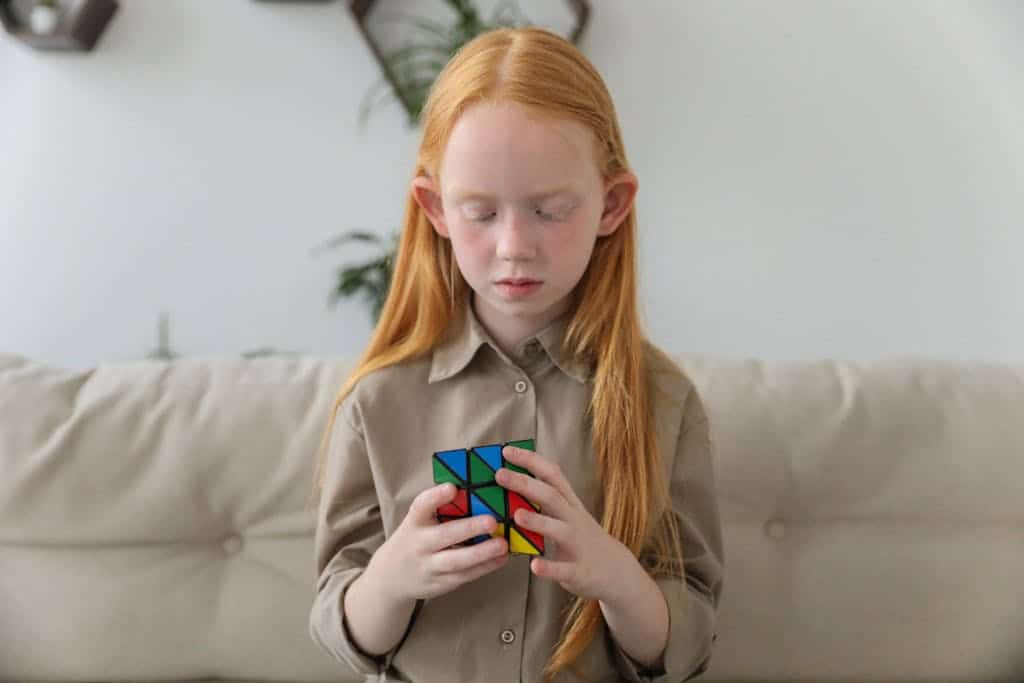
By presenting problems in a playful and interactive format, children develop perseverance and resilience as they work through the puzzles, building essential cognitive skills that are applicable across various areas of learning and life.
Math Word Problem Stones
This is a creative and interactive summer math game designed to enhance children’s mathematical skills while fostering imagination and critical thinking.
To play, start by painting or drawing various math-related images on stones and placing them in a bag. These images can include numbers, mathematical symbols, shapes, a specific number of objects, forms of measurement, or even equations.
Once the stones are ready, children take turns drawing two or three of them from the bag and using the images on the stones they pull to create math word problems for their peers to solve.

For example, if a child draws a stone with the number 5 and another stone with a picture of 7 apple trees, they might create a word problem such as, “If there were 5 apples on each of the 7 apple trees at the orachard, but I take 6 of those apples to bake a pie, how many apples are left?”
This game encourages children to think creatively and apply math concepts in a fun and engaging way. It also helps improve their problem-solving skills as they navigate through different scenarios and come up with solutions.
Experiment with these activities with your elementary-aged kids to see which ones they enjoy the most. Adjust the activities to match your child’s skill level and observe how they learn through play.
Frequently Asked Questions
What are Montessori-aligned math games?
Montessori-aligned math games are hands-on activities designed to promote learning through exploration and discovery, following the principles of the Montessori method. These games focus on concrete materials and self-directed learning, allowing children to engage with math concepts in a meaningful and interactive way.
By incorporating manipulatives and open-ended activities, Montessori-aligned math games help children develop a deep understanding of mathematical concepts while fostering independence and creativity.
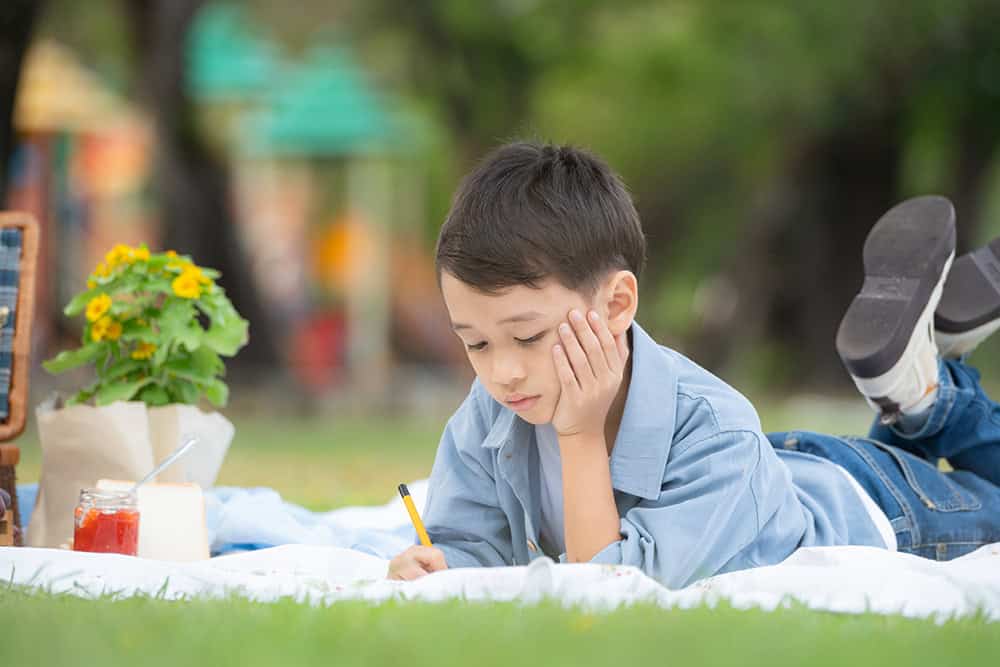
Why should kids practice math over summer break?
Practicing math over summer break is essential for preventing the dreaded summer brain drain, a phenomenon where students lose academic skills and knowledge over the extended vacation period. Engaging in math activities during the summer helps children maintain their mathematical skills, preventing regression and ensuring a smooth transition back to school in the fall.
Additionally, summer math practice provides opportunities for children to explore math in a relaxed and enjoyable environment, fostering a positive attitude towards learning and building confidence in their abilities.
How often should kids play math games for summer learning?
While the frequency of math game engagement can vary depending on individual preferences and schedules, I recommend incorporating math activities into children’s daily routines during the summer break.
Consistent engagement with math games, even for short periods each day, can help children retain and reinforce their mathematical skills while keeping their minds active and engaged. However, it’s essential to strike a balance between structured learning activities and free time for play and relaxation to ensure a well-rounded summer experience.

The Wrap-Up: Math Games for Summer Learning
With these 11 Montessori-aligned math games, summer learning becomes an enjoyable and enriching experience for elementary-aged children. By incorporating hands-on activities, children can strengthen their math skills while having fun and staying engaged during the summer break.
So, grab some materials, gather the kids, and prevent summer learning loss with math games!
Be sure to Pin this blog so you can find it easily later!
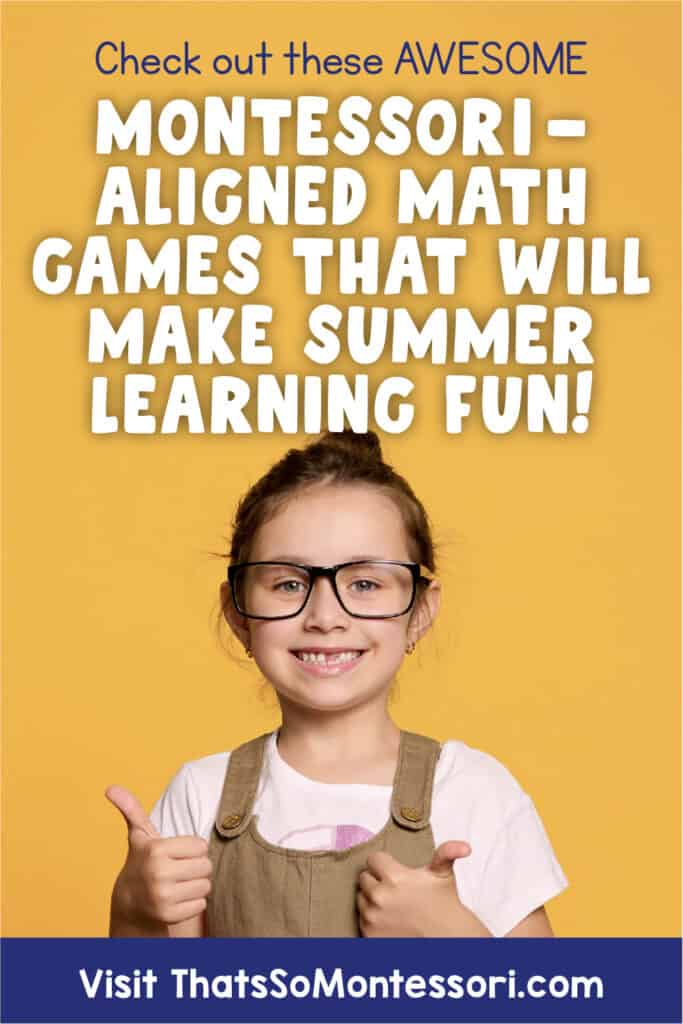
Keep your kids busy learning with the activities in these blogs:
11 Ways to Use Our Roll A Story Dice Game
57 Epic Montessori-Aligned Spring Break Activities for Your Kids
13 Engaging Vocabulary Development Activities for Elementary Kids
Rebus Puzzles for Kids: A Comprehensive Riddle-Solving Guide
9 Unique Rebus Puzzles with Answers for Kids
31 Fun Summer Reading Activities Elementary Students Will Love
The Best Neighborhood Walk Scavenger Hunt
8 Easy Rebus Puzzles with Answers
Score Big with These 9 Super Bowl Classroom Activities
27 Educational YouTube Channels to Prevent Summer Learning Loss


